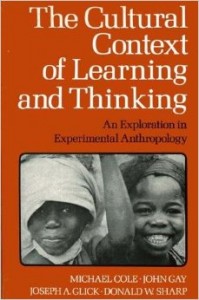Cole, M., Gay, J., Glick, J. A. & Sharp, D. W. (1971). The Cultural Context of Learning and Thinking: An Exploration in Experimental Anthropology (full text).
“After intensively studying for several years the thinking processes of members of a tribal group in Western Africa, the Kpelle, the authors examine the relation between culture and cognitive development. The following issues are discussed: (1) an analysis of the terms ‘culture’ and ‘cognition’; (2) an ethnographic description of the Kpelle culture, with particular attention to the role of classification in the three major classes of learning phenomena: the role of classification in memory and learning, the process by which attributes are combined to form concepts, and the way in which various problems are solved; (3) classification in learning, with special attention to the way in which material is organized by the learner and the teachers; (4) the influence of social factors on concept formation; (5) an analysis of stimulus-specific versus generalized learning; (6) an examination of tasks that vary in complexity and in the importance of verbal formulations for their solution; and, (7) implications of these findings both for future research and for immediate application, particularly the problems posed by the educational performance of America’s minority groups. Appendices contain methodological procedures employed as well as a more detailed presentation of the information gathered for this study” (Summary lchcautobiod from Eric.ed.gov).
Additional Information about “The Cultural Context of Learning and Thinking”
Additional Resources about the Cultural Context Project
- Reversal and Nonreversal Shifts Among Liberian Tribal People (Cole, Gay & Glick, 1968)
- Linguistic Structure and Transposition (Cole, Gay, Glick & Sharp, 1969)
- Culture and Memory (Cole & Gay, 1972)
Read more in Chapter One and Chapter Eight
Back to LCHC Projects

